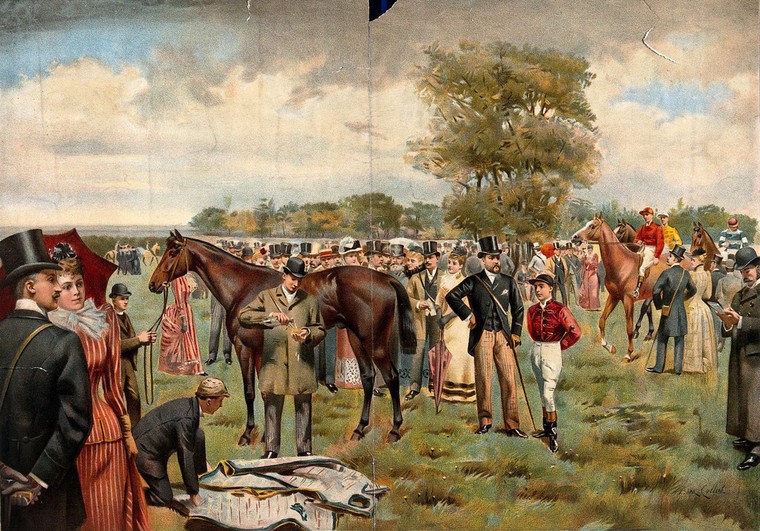
June 1, 2023, by ahzsa
Harry Cocks’s new article on the Conservative Party and horse-racing in Parliamentary History
In May 2023 the Jockey Club, organisers of the Epsom Derby, which has been run almost every year since 1780, gained an injunction against the animal rights group Animal Rising to try and prevent them invading the race when it is run on 3rd June. The group threatens to stop the race because of what they see as cruelty in horse racing, staging a second protest following their demonstrations at the Grand National steeplechase in April, which delayed the start of that race by fifteen minutes and led to several arrests.
Horse racing has often been controversial, and the Derby was the scene of the famous suffragette protest of 1913 that ended in the death of Emily Wilding Davison, but it has not always attracted criticism for reasons of animal welfare. In a new article for Parliamentary History, available on Nottingham’s RIS repository, Harry Cocks explains that in Edwardian Britain horse racing was attacked by Radical Liberals and other progressives because of its links to gambling, which was then illegal outside racecourses. Betting was seen as having a degrading effect on the working class and white collar punters who formed its main market. The reliance on chance, not to mention the effects on the household budgets of the poor, were seen as undermining the moral sense, and in that regard, to be anti-progressive. In response to this, racing became a political matter, being defended by Conservatives (and some Liberals) as part of the birth right of freeborn Englishmen entitled to their historic pastimes. In that respect, racing (and sport in general) became a Tory cause, and helped the party – in the doldrums electorally after 1902 – appeal to a new mass electorate in cities. Sport was a valuable resource in the development of a popular Conservatism that spread the party’s appeal beyond its aristocratic base.
The defence of racing, and of gambling, was one of the main purposes of the late-Victorian and Edwardian sporting press, the most important of those titles being the Sporting Times (established 1861), the Sportsman (1865) and the Sporting Life (1859), the Winning Post (1904), and others. These titles sought to unite the older traditions of the aristocratic, landed party, with the newer quasi-democratic electorate brought in by the third Reform Act of 1884. The masthead slogan of the Sporting Times (“High Toryism, High Churchism, High Farming, and Old Port for ever”) was a celebration of Tory traditions. However, the paper, and its fellow sporting titles, also tried to appeal to a mass public through defending racing and gambling from moral campaigners – who they denounced as “faddists.” The sporting press was vital in the founding of the Sporting League (1894) and the National Sporting League (1905), both of which aimed to defeat Radical Liberal schemes to curb racing. Some of those involved, such as the rambunctious proprietor of the Winning Post, Robert Sievier, also became Conservative politicians. He was joined in that enterprise by men like Thomas Henry Dey, bookmaker, local councillor, and staunch member of the Canonbury (N London) Conservative party. In this way, the sporting press and racing itself became allied to an emerging popular Conservatism that was to help revive the fortunes of the party.
No comments yet, fill out a comment to be the first

Leave a Reply